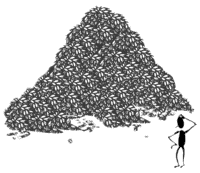(It happened at a grocery checkout in Portland, OR) Lotteries & Casinos
Desirable things are a lot nicer to think about than less desirable things. The winning lottery ticket is nice to dwell on. The tens of millions of non-winning tickets are so easy to forget. "Think positive!" However, a person who understands how statistics works is mystified by the person who plays the lotteries and casinos with dogged persistence, feeling that the longer the play goes on, the more likely he or she is to come out ahead. Statistics tells a very different story: the more and more plays that are made, the more and more the net loss gets closer to the value set up statistically by the lottery or casino. Random small wins are built in to entice suckers, but long times of play more and more assure that the player loses. Bob Park, the U of Maryland physicist who runs the "What's New" blog suggests to the statistcially naive: "Just send us [your] dollar. The odds of winning are exactly the same, to within eight significant figures." What's New Much of modern science rests on a firm
foundation of statistics: thermodynamics, quantum mechanics, most of psychology,
sociology, and economics. Those who use statistics have observed
the predictive value of statistics. Those who expect to win in the
lottery or casino are at a terriblly lopsided disadvantage compared with
the scientific literate -- they are "losers" in another Bob Park witticism
(see
bottom of this page.)
|
|
||||
|
NEXT: The Many Dimensions of Color |
|||||

